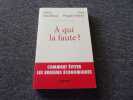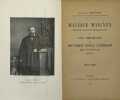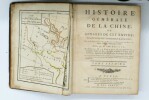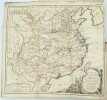-
Type
Book (20896)
Magazine (155)
Manuscript (4)
Old papers (8)
-
Latest
Last 24h (6)
Last 3 days (7)
Last month (106)
Last week (5)
-
Language
Dutch (2)
English (10)
Finnish (1)
French (21030)
German (10)
Italian (5)
Spanish (3)
Swedish (2)
-
Century
16th (10)
17th (27)
18th (263)
19th (910)
20th (10690)
21st (1726)
-
Countries
Belgium (1638)
Brazil (3)
Canada (6)
Côte d'Ivoire (38)
Denmark (230)
France (16900)
Greece (10)
Italy (16)
Netherlands (151)
Switzerland (2071)
-
Syndicate
ALAC (6)
CLAQ (2)
CNE (1)
ILAB (13303)
NVVA (1808)
SLACES (1657)
SLAM (11388)
SNCAO (5)
Organizational Design Development and Behavior: A Situational View
Scott Foresman (Elementary Group Pearson Educatio 1977 451 pages 23 114x2 54x16 51cm. 1977. Broché. 451 pages.
Bon état de conservation couverture défraîchie intérieur propre
"Le Nationalisme Economique"
"1963. Paris Éditions Payot 1963 - Broché 14 5 cm x 23 cm 246 pages - Texte de M. A. Heilperin préface de Jacques Rueff - Notes du propriétaire précédent sinon bon état"
La civilisation de l'universel. Inventaire de l'avenir.
Couverture souple. Broché. 282 pages.
Livre. Préface de Julien Cain. Editions Robert Laffont/Gonthier, 1966.
A QUI LA FAUTE? Comment eviter les erreurs economiques
format moyen, couverture souple.265 pages.bon état 2016 Fayard
Gérer les hommes de la jeune entreprise
Chotard Editeurs. 1993. In-8. Broché. Bon état, Couv. convenable, Dos satisfaisant, Intérieur frais. 200 pages augmentées de nombreux graphiques en noir et blanc,dans le texte.. . . . Classification Dewey : 330-Economie
Classification Dewey : 330-Economie
Bonjour paresse, de l'art et de la nécessité d'en faire le moins possible en entreprise.
Michalon. 2004. In-12. Broché. Bon état, Couv. convenable, Dos satisfaisant, Intérieur frais. 118 pages.. . . . Classification Dewey : 330-Economie
Classification Dewey : 330-Economie
Tchao LA France: 40 raisons de quitter votre pays
Editions 84 2012 256 pages 11x1 8x17 8cm. 2012. mass_market. 256 pages.
Très bon état - légères marques de lecture et/ou de stockage mais du reste en très bon état- expédié soigneusement depuis la France
Soziale Bewegungen und Theorien bis zur modernen Arbeiterbewegung
Teubner , Aus Natur und Geisteswelt Malicorne sur Sarthe, 72, Pays de la Loire, France 1906 Book condition, Etat : Bon cartonnage, éditeur pleine toile In-8 1 vol. - 162 pages
Dritte Auflage Contents, Chapitres : Orientalische Kulturvölker - der platonische Staat - Agrarbewegung im alten Rom - die Utopia des Thomas Morus - aus der Zeit der Reformation und des Bauernkrieges - aus dem 17.und 18. Jahrhundert in Frankreich - ein Jahrhundert wirtschaftlicher Entwicklung in England - Sozialisten der ersten hälfte des 19. Jahrhunderts - Proudhon quelques rousseurs
Maurice Maignen, directeur du Cercle Montparnasse. et les origines du mouvement social catholique en France (1822-1890)
Luçon, S. Pacteau, 1927 2 forts vol. in-8, XI pp., 683 pp. ; [2] ff. n. ch., pp. 685-1358, avec 2 portraits-frontispices, brochés. Dos abîmés.
Unique édition, peu commune.Maurice Maignen fut le fondateur, avec Albert de Mun, de l'Œuvre des cercles catholiques d’ouvriers, association visant à rechristianiser les milieux populaires. C'est son neveu, le Père Charles Maignen (1858-1937) qui composa cette biographie : il est lui-même une des figures les plus intéressantes du catholicisme social au tournant des deux siècles, dans sa version intégraliste, que les remarquables travaux d'Émile Poulat ont bien mis en lumière. Chez ce fils de saint Vincent de Paul, combat contre l'américanisme et le modernisme vont de pair, voire s'intègrent à une vision sociale intégralement animée par la doctrine de l'Église. - - VENTE PAR CORRESPONDANCE UNIQUEMENT - LIEN DE PAIEMENT, NOUS CONSULTER.
Le Prêtre du peuple, ou La Vie d'Henri Planchat. prêtre de la Congrégation des frères de Saint-Vincent de Paul, aumônier du patronage des apprentis et des jeunes ouvriers de Sainte-Anne, à Charonne ; l'un des otages de la Commune, fusillé à Belleville, le 26 mai 1871, en haine de la religion. Dixième édition revue et augmentée
Paris, Pierre Téqui, 1924 in-12, VIII pp., 288 pp., [4] ff. n. ch., avec un portrait-frontispice, broché. Dos défraîchi.
Après divers postes à Paris et Arras, Mathieu-Henri Planchat (1823-1871) fut désigné comme aumônier du Patronage Sainte-Anne (au 81, rue de la Roquette), dont les Frères de St-Vincent de Paul avaient pris la direction en mars 1862, et il fit partie des victimes du massacre de la rue Haxo le 26 mai 1871.Sa biographie, composée par son confrère de la Société de Saint-Vincent de Paul Maurice Maignen (1822-1890), par ailleurs fondateur avec Albert de Mun de l'Œuvre des cercles catholiques d’ouvriers, était parue d'abord en 1877, faisant suite à une sommaire Notice sur l'abbé Henri Planchat (1871).Le Quillec, 2954 (toujours le même laconisme pour certains titres ou certains auteurs ...). - - VENTE PAR CORRESPONDANCE UNIQUEMENT - LIEN DE PAIEMENT, NOUS CONSULTER.
La division du travail manuel et intellectuel et sa suppression dans le passage au communisme chez marx et ses successeurs - Collection documents et recherches d'économie et socialisme n°8.
François Maspero. 1975. In-8. Broché. Bon état, Couv. convenable, Dos satisfaisant, Papier jauni. 130 pages - couverture contrepliée.. . . . Classification Dewey : 330-Economie
Collection documents et recherches d'économie et socialisme n°8. Classification Dewey : 330-Economie
Histoire économique de la France au XXe siècle- Cahiers français n°255- Mars-Avril 1992
La documentaion Française. 1992. In-4. Broché. Bon état, Couv. convenable, Dos satisfaisant, Intérieur frais. 125 pages illustrées en noir et blanc, dans le texte. Texte sur plusieurs colonnes.. . . . Classification Dewey : 330-Economie
Classification Dewey : 330-Economie
MAILLA, (Père Joseph-Anne-Marie de Moyrac de), GROSIER (J.B.,Abbé, éditeur)
Reference : PHO-1678
(1777)
Histoire générale de la Chine ou Annales de cet Empire traduites du Tong-Kien-Kang-Mou par le feu Père Joseph-Anne-Marie de Moyrac de Mailla, jésuite françois, missionnaire à Pékin, publiées par M. l'Abbé Grosier et dirigées par Le Roux des Hautrayes
Paris : chez Ph.-D. Pierres & Clousier, imprimeur-libraire, rue saint-Jacques, 1777-1785. 12 volumes in-4 (260x200mm), relié veau époque , dos à nerfs orné avec titre et tomaison, dos frottés , illustré de 14 planches (sur 16) et 2 cartes dépliantes contours en couleurs par Brion d’après le P. de Mailla (sur 3), relié plein veau marbré époque, dos à nerfs orné, tranches rouges, dos cassé au tome 1, frottements, quelques charnières fendues, coins et coiffes usés, manque au dos tome 8, trace de vieille humidité au tome 8, manque les pièces de tomaison (tome 1,4,8) et pièce de titre tome 12,quelques brunissures et taches.
Édition originale de la 1ère histoire complète de la Chine dans une langue européenne. Les 11 premiers vol. contiennent l'histoire des dynasties chinoises par le jésuite français Moyriac de Mailla (1669-1748), complétée et éditée par l'abbé Grosier (1743-1823). Le tome XII contient "Apperçu des mœurs, des sciences & des arts des Chinois considérés relativement à la constitution de leur gouvernement & à leurs études", une nomenclature des départements, une notice historique sur la Cochinchine, un "Mémoire historique sur le Tong-King", une "Notice historique sur les premières entreprises des Russes contre les Chinois", une table générale des matières et 2 nomenclatures. Liste des souscripteurs dans les t. I, III, V & VII, un 13eme volume est paru en 1785 est rédigé par Grosier seul et contient une description topographique de la Chine et des observations sur les villes, la population, les productions, le gouvernement, la religion, les mœurs et usages, les arts et les sciences, etc. Série rare d’une œuvre majeure sur la Chine par le père de Mailla qui fut missionnaire en Chine 1703 à sa mort en 1748. Mathématicien à la cour de Kangxi, Joseph de Mailla a travaillé pendant dix-huit ans à établir des cartes de l'empire. Il a publié plusieurs livres en chinois sur le Christ, le catéchisme et les saints. Joseph de Mailla a rédigé la première histoire complète de la Chine en une langue européenne. Cet ouvrage en douze volumes, qui contient des cartes et des plans, n'est publié que trente ans après sa mort. Pour les neuf premiers volumes, il s'agit d'une version abrégée du Tongjian Gang mu compilé par Zhu Xi au XIIe siècle et complété par Shang Lu au XVe siècle. Les volumes X et XI, qui traitent de la Chine sous les Ming et les Qing, se basent sur les écrits de différents historiens chinois. Le volume XII contient diverses annexes dues à différents auteurs. La Description générale de la Chine de l'abbé Grosier constitue le plus souvent le treizième volume de l'ouvrage.
LE MARCHE FAIT SA LOI
Mille et Une Nuits. 2001. In-8. Broché. Bon état, Couv. légèrement pliée, Dos satisfaisant, Intérieur bon état. 120 pages.. . . . Classification Dewey : 330-Economie
De l'usage du crime par la mondialisation. Essai. Classification Dewey : 330-Economie
LE NOUVEAU MARCHE DU TRAVAIL - COLLECTION SOCIETE N°24
SEUIL. 1968. In-12. Broché. Etat d'usage, Couv. légèrement passée, Dos plié, Intérieur frais. 141 Pages - Quelques annotations au stylo dans la marge de l'ouvrage sans conséquence pour la lecture - Coiffes abîmées. . . . Classification Dewey : 330-Economie
Classification Dewey : 330-Economie
DECF : Annales corrigés, controle de gestion, 1982-1990
CLET. 1991. In-8. Broché. Etat d'usage, Couv. légèrement passée, Dos satisfaisant, Intérieur frais. 260 pages.. . . . Classification Dewey : 330-Economie
Epreuve n°7 Classification Dewey : 330-Economie
Histoire des faits économiques des origines au XXeme siècle
Payot ,1952, in-8 de 362 pages ,ill. in-t., ,br. ,Bon état , .(1 photo sur mon site https://www.vieuxlivre.fr .Les frais de port pour la France sont offerts à partir de 20 euros d'achat (Mondial relay )et 30 d'achat (colissimo suivi ).
HISTOIRE DES FAITS ÉCONOMIQUES, des origines au XXème siècle
Paris Payot 1952 in 8 (23x14,5) 1 volume broché, 362 pages. Collection ''Bibliothèque historique''. Bon exemplaire ( Photographies sur demande / We can send pictures of this book on simple request )
Bon
Histoire des faits économiques des origines au XXe siècle
Payot. 1952. In-8. Broché. Bon état, Couv. convenable, Dos satisfaisant, Quelques rousseurs. 362 pages. Marque à l'encre sur la page de garde. Recouvert d'un film transparent.. . . . Classification Dewey : 330-Economie
Classification Dewey : 330-Economie
Histoire des faits économiques des origines au XXe siècle.
1952 Paris, Payot, 1952, in 8° broché, 362 pages ; couverture très légèrement fanée.
...................... Photos sur demande ..........................


Phone number : 04 77 32 63 69
Histoire des faits économiques des origines au XXe siècle. Bibliothèque Historique. Payot. Paris. 1952.
1 volume in-8° broché, 362 p. non coupé. Très bon état.
Phone number : 06.31.29.75.65
Histoire des faits économiques. Mémentos Dalloz.
Paris, Librairie Dalloz, 1970. 16 x 24, 160 pp., broché, bon état.
Histoire des faits économiques - mémentos dalloz
Dalloz 1970 in8. 1970. Broché.
couverture frottée et ternie
La construction européenne - Résultats et perspectives
Paris, P.U.F. 1975 242pp., dans la collection SUP section "L'économiste", br., bon état, G39194
LA CROISSANCE ECONOMIQUE
PUF. 1966. In-8. Broché. Etat d'usage, Couv. convenable, Dos satisfaisant, Intérieur frais. 127 pages - étiquettes collées sur le 2nd plat.. . . . Classification Dewey : 330-Economie
Classification Dewey : 330-Economie
 Write to the booksellers
Write to the booksellers




















